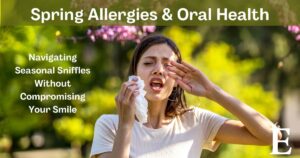Spring Allergies and Oral Health
Navigating Seasonal Sniffles Without Compromising Your Smile
Spring ushers in a bloom of new life, warmer weather, and, for many of us, the less welcome arrival of seasonal allergies. While the connection between spring allergies and oral health may not be immediately obvious, those of us who find ourselves amidst a symphony of sneezes and sniffles might be surprised to learn that our dental health can also be affected during allergy season. Today, we’re delving into how allergies can impact your oral health and offering practical tips to manage these symptoms without compromising the well-being of your smile.
How Do Seasonal Allergies Affect Oral Health?
Dry Mouth: One of the hallmark symptoms of allergies is nasal congestion. This condition forces us to breathe through our mouths, leading to dry mouth (xerostomia). Saliva is crucial for washing away food particles and neutralizing acids produced by bacteria in the mouth. A reduction in saliva can increase the risk of cavities, gum disease, and bad breath.
Sore Throat: Postnasal drip, a common allergy symptom, can cause a persistent, irritating sore throat. Besides being uncomfortable, a sore throat can make swallowing painful, potentially affecting your choice of foods and beverages, with some people turning to sugary drinks or lozenges for relief.
Tooth Pain: Sinus pressure is another side effect of the spring allergies and oral health impact. The maxillary sinuses, located just above your upper teeth, can press down on the tooth roots when inflamed, leading to feelings of toothache and discomfort.
Tips for Managing Allergy-Related Oral Health Issues
Stay Hydrated: Combat dry mouth by drinking plenty of water throughout the day. This helps maintain saliva flow, rinsing away bacteria and food particles. Avoid beverages that can exacerbate dryness, such as coffee, alcohol, and sugary drinks.
Rinse Your Mouth: After a bout of postnasal drip, gently rinse your mouth with water or a fluoride mouthwash. This can help neutralize acid levels in your mouth, soothe your throat, and keep your mouth feeling fresh.
Chew Sugar-Free Gum: Chewing sugar-free gum can stimulate saliva production, helping to combat dry mouth and protect your teeth from cavities.
Maintain Good Oral Hygiene: Brushing twice a day with fluoride toothpaste or one with hydroxyapatite and flossing daily are always important, but even more so during allergy season. Good oral hygiene practices can help mitigate the effects of dry mouth and reduce the risk of tooth decay.
Use a Humidifier: If you’re prone to breathing through your mouth while sleeping, using a humidifier in your bedroom can add moisture to the air, helping to alleviate dry mouth and soothe irritated throat tissues.
Seek Allergy Treatment: Over-the-counter or prescription allergy medications can effectively reduce symptoms, including those that impact your oral health. Always consult with your healthcare provider to find the best treatment plan for your needs.
Consult Your Dentist: If you’re experiencing discomfort or have concerns about how allergies are affecting your oral health, schedule a visit with your dentist. They can offer personalized advice and treatment options to help protect your teeth and gums.
Spring allergies can be a nuisance, but with the right strategies, their impact on your oral health can be minimized. By staying hydrated, maintaining good oral hygiene, and managing allergy symptoms effectively, you can enjoy the beauty of spring without letting allergies dull your smile. Remember, your dentist is a valuable resource for tips and treatments to ensure your oral health remains a top priority, no matter the season.
Dr. Euzarraga, awarded Ahwatukee’s BEST DENTIST, and the team at Dr. E’s Cosmetic & Family Dental are here to help with all your dental needs. Call us at 480-494-2435.


